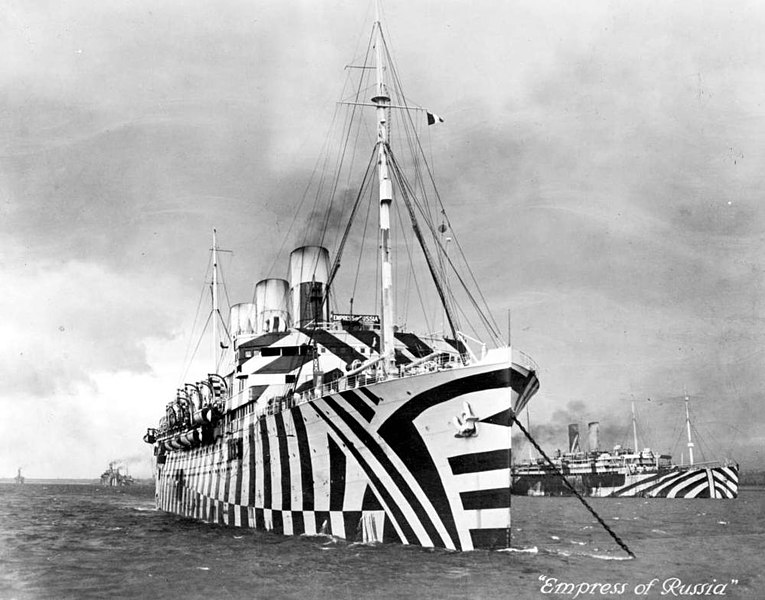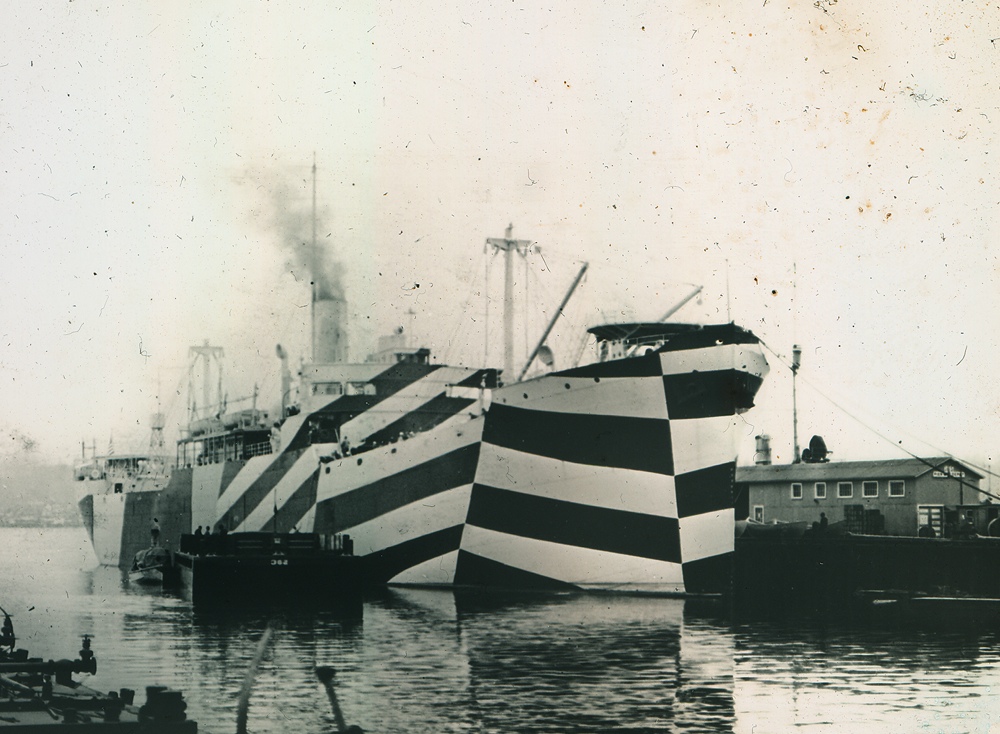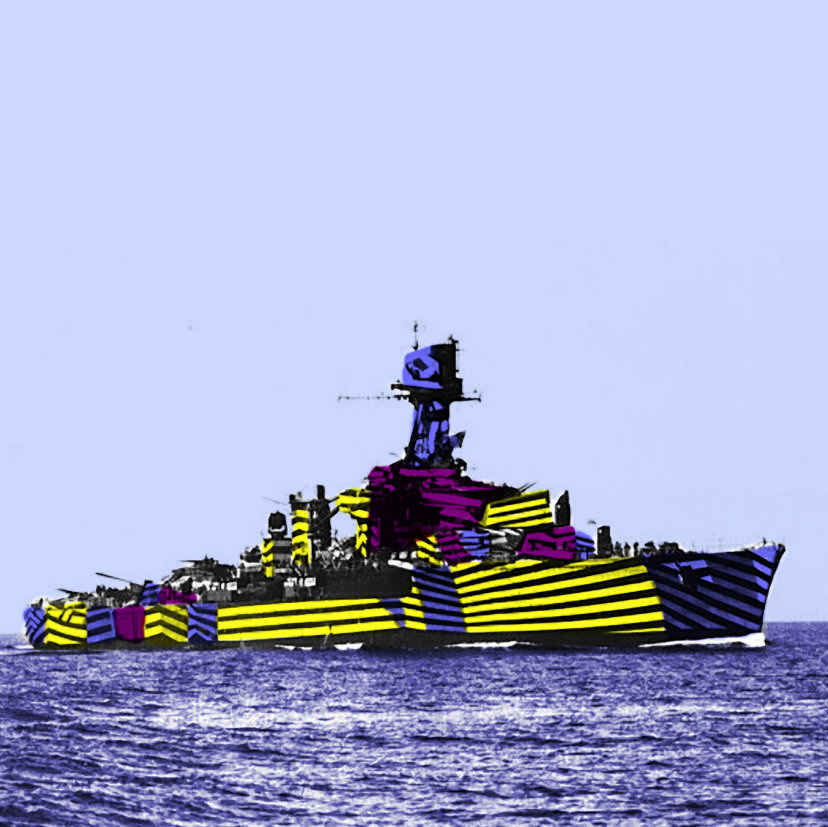
dazzle camouflageWW1 Dazzle camouflage
The military soon learned of the public attraction for razzle-dazzle camouflage. Women went to work painting crazy patterns on tanks, ambulance and trucks for parades and other wartime events. One of those women, Edith Barry, grew up in a wealthy New Jersey family but summered in Kennebunkport. Before the war, she studied painting and sculpture.

Razzle Dazzle Dazzle camouflage, Camo wallpaper, Razzle dazzle
Camouflage, also called cryptic coloration, is a defense mechanism or tactic that organisms use to disguise their appearance, usually to blend in with their surroundings. Organisms use camouflage to mask their location, identity, and movement. Grades 5 - 12+ Subjects Biology, Ecology, Geography Photograph Eastern Screech Owl

The History of Razzle Dazzle Camouflage » TwistedSifter
Dazzle camouflage, also known as razzle dazzle (in the U.S.) or dazzle painting, was a ship-camouflage technique used extensively in WWI, and to a lesser extent in World War II and subsequent wars.

Dazzle camouflage Dazzle camouflage, Camo patterns, Nature inspiration
Submarine warfare in the latter stages of the First World War would lead to one of the most interesting methods of camouflaging ships — dazzle camouflage, also known as razzle dazzle.

Vintage Photos of America's Heroic Ships The Weather Channel Dazzle camouflage, Razzle
Dazzle Camouflage from Joe Myers on Vimeo. "It's counterintuitive. People can't really believe that you could interfere with the visibility of something by making it more highly visible, but.

Pin on getting there
Dazzle camouflage, also known as razzle dazzle (in the U.S.) or dazzle painting, is a family of ship camouflage that was used extensively in World War I, and to a lesser extent in World War II and afterwards.

Camouflage Razzle Dazzle boats Dazzle camouflage, Razzle dazzle, Dazzle
Dazzle camouflage (also known as Razzle Dazzle or Dazzle painting) was a military camouflage paint scheme used on ships, extensively during World War I and to a lesser extent in World War II.

The Razzle Dazzle Camouflage When British Artists Fought German UBoats The Shipyard
Bold 'razzle dazzle' camouflage fools the eye Locusts' compound eyes are fooled by motion dazzle camouflage, which uses bold contrasting patterns to confuse the viewer's sense of speed and trajectory.

Razzle Dazzle 99 Invisible
British Artist and naval officer Norman Wilkinson had this very insight and pioneered the Dazzle Camouflage movement (known as Razzle Dazzle in the United States). Norman used bright, loud colours and contrasting diagonal stripes to make it incredibly difficult to gauge a ship's size and direction.

The Razzle Dazzle Camo of World War I • Damn Interesting
Dazzle camouflage, also known as razzle dazzle camouflage, is a bit of a misnomer, as it didn't really camouflage the ship in the way that traditional camo makes the wearer blend into their surroundings. It's actually a lot more interesting than that, and it helped the Allies sail to success in WWI. Read next: Sink or Swim, the USS Texas.

DAZZLE, new interactive installation at the San Diego Airport, is inspired by a camouflage
Razzle Dazzle Visuals 11.05.12 Producer 99pi This is probably not what you think of when you think of camouflage. Becoming invisible with your surroundings is only one type of camouflage. Camofleurs call this "high similarity" or "blending" camouflage. But camouflage can also take the opposite approach. Think about zebras.

Razzle Dazzle Camo r/polymer80
In the military's case, it was to disguise ships and aircraft with what is known as disruptive or "dazzle" camouflage. The word camouflage is derived from the French word camoufler, which means to disguise. Draping a white bedsheet over a tank or artillery piece in a snowy landscape is an obvious example of camouflage.

The Camouflage That Dazzled JSTOR Daily Dazzle camouflage, Camouflage, Op art
Razzle Dazzle Camouflage — The Collectors List Dazzle camouflage (also known as Razzle Dazzle or Dazzle painting) was a military camouflage paint scheme used on ships, extensively during World War I and to a lesser extent in World War II. The idea is credited to the artist Norman Wilkinson who was serving in the Royal Naval Volunteer Reserve whe

Dazzle camouflage, also known as razzle dazzle or dazzle painting, was a family of ship
Dazzle camouflage (also known as Razzle Dazzle or Dazzle painting) was a military camouflage paint scheme used on ships, extensively during World War I and to a lesser extent in World War II. The idea is credited to the artist Norman Wilkinson who was serving in the Royal Naval Volunteer Reserve when he had the idea in 1917.

Razzle Dazzle Camouflage — The Collectors List
One of Germany's most feared weapons during World War I was its fleet of submarines that targeted ships with torpedoes. A Royal Navy volunteer reserve lieutenant, Norman Wilkinson, came up with a.

Razzle dazzle The ‘camouflage’ that helped Britain in the war at sea Dazzle camouflage
Dazzle ships, also known as "razzle-dazzle" ships, were a type of naval camouflage first used during World War I. The idea behind dazzle camouflage was to use bold, geometric patterns and contrasting colours to break up the silhouette of a ship.